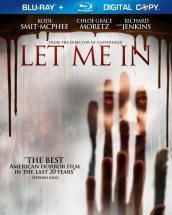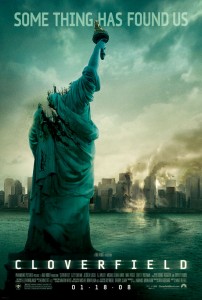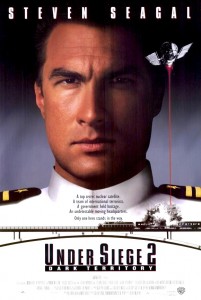One of the scariest things about the horror film LET ME IN, which is about a bullied young boy Owen (Kodi Smit-McPhee) who befriends vampire girl Abby (Chloe Moretz), is that it’s a remake of the excellent Swedish film LET THE RIGHT ONE IN. To tackle such a perfect film for American audiences could have been a suicide mission for any other filmmaker. However, writer-director Matt Reeves managed to take the seeds that made the original film so perfect and translate it beautifully with LET ME IN (which hits DVD and Blu-ray his week).
The CLOVERFIELD helmer spoke with ASSIGNMENT X recently in this exclusive interview about LET ME IN, finding a way to make it his own and the status of CLOVERFIELD 2.
ASSIGNMENT X: When someone says, “hey, there’s this great film, let’s remake it,” are you hesitant to tackle something so beloved?
REEVES: I wasn’t hesitant, I said “no.” What happened, I was taking a film around [THE INVISIBLE WOMAN] right after CLOVERFIELD in January 2008. The Swedish film [LET THE RIGHT ONE IN] didn’t come out until October of 2008 in the U.S. I don’t think it had come out anywhere, it was just in festivals. Different distributors had seen it and were all pursuing the rights because they thought this was such a great story and a remarkable film. The project I brought to them was too dark and character based. It was actually less of a genre film and very much a darker character story.
I brought Overture [Films] this script. They thought it was beautifully written, but said it was too challenging, but “we loved the script and we really liked CLOVERFIELD, let’s figure out something to do.” And I said, “what would you like to do?” And they showed me the film, and I said, “you’re right, that’s a terrific movie, and I don’t think you should remake it.” And they said, “we believe in it and can bring it to an English speaking audience because it’s such a great story.” I said, “good luck with it.” And they said, “please don’t say ‘no’ yet, think about it, we’re going to pursue the rights.” Actually, they didn’t end up getting the rights. Hammer Films did and Overture approached them about distributing the film.
During that time, after I initially said “no,” it so resonated with me about growing that I wanted to know more about it and I decided to read the novel. I fell in love with it more after reading the novel. I started seeing the possibilities, because it was taking place in Sweden in the 1980s, at a time I was growing up in the United States, because John [Ajvide] Lindqvist [who scripted the original based on his own novel] and I are about the same age. I thought that maybe there is a way to be very faithful to this love story, this sort of horror story, between these two kids and related it to this context that I remember. So I wrote to Lindqvist and he was very supportive. He really loved CLOVERFIELD And said, “you know, I’m excited about you doing this, because I loved CLOVERFIELD, but more importantly, the fact you’re telling me it resonated with you personally means a lot to me, because to me the story, is the story of my adolescence minus the vampires.”
So despite my better instincts, I decided to do it. I was very, very careful not to look at the original movie anymore and I asked my cast and crew to not watch it. My director of photography had never seen it, the actors had never seen it and I knew the best way to realize our version of the story was to make it in as personal a way as possible and try to make it as if we were making it for the first time. So that’s what we tried to do.
AX: When Hammer decided to get back into the movie business, were they trying to evoke what their previous brand was in the past, or did they say, “just go make the best movie you can make.”
REEVES: Pretty much, “go make the best movie you could make.” They loved the story, as much as we did. One of the producers involved in Hammer had followed the book before the film came out and thought this was a great story. They thought, “is there any chance to put Hammer this or Hammer that” in it just for the Hammer fans, but they didn’t press on any of it, because all they cared about was making the movie as best as possible and they knew my reasons for wanting to make it were my personal connections to the story. They were very supportive. I think they were very conscious of the fact that this was something quite different than what the Hammer label was, and that was exciting for them. They felt this was a way to bring the label back, but being a different kind of thing.
AX: I feel like the theatrical release wasn’t as big as it should have been – what happened with the studio at the time?
REEVES: I had a great experience making the movie with Hammer and Overture. Unfortunately, Overture, somewhere along the way of making the movie, their future was in question. The executives there were so supportive of the movie and loved the movie, but by the time we were ready to be released as we were finishing up – they got fired and the future of the company was declared, which was it would cease to exist except as a [film] library [company]. So just before we were released, our distributor went out of business. Relativity ended up taking their marketing department and bringing them over. There was a lot going on in terms of transition. We were fortunate enough we got a release. It was possible we could have went into limbo. There were also marketing challenges of an R-rated film that stars two young kids who aren’t particularly known and it was a challenge that was too tough at the moment.
AX: Did you entertain the idea of doing a longer cut for the Blu-ray/DVD release?
REEVES: I follow the message boards and a lot of people liked the deleted scene where you see and understand how Abby was turned into a vampire. That scene, I loved it. It never actually lived in the movie, because when we started editing the movie, there was a tonal shift that didn’t work. Owen and Abbie’s characters had come together very powerfully in the scene where she bleeds and suddenly he’s questioning her in this way that makes them seem more emotionally distant. I thought they were brilliant in the scene, and I always knew I wanted to release the scene online.
I’ve seen places where people said, “I hope you release a version of the movie that has all of the scenes cut out, put back in.” That version never existed. The only way to do that is if they opened up the editing room and let us put that movie back together in a way that never quite existed. To be honest though, I didn’t put it in, when we were editing, because it didn’t work. I didn’t necessarily want that version of the movie to exist anyway, but it wasn’t even an option to do. We have a lot of other things on the DVD – a bunch of other behind-the-scenes stuff, the car crash making of and commentary and things. We didn’t have an alternate version of the movie. We do have that scene on there, and a couple of other scenes, but they are not in a version that is complete.
AX: Do you feel you could do a follow-up to this movie down the road or do you feel it should stand-alone?
REEVES: To me, no. That would be completely contingent on what Lindqvist does. I would never want to put out what my version would be. For me, the ending of LET ME IN, was intended to be like the ending of THE GRADUATE – boy gets girl, and together they’re on the bus at the end. And there is that lingering question of “now what?” That was the tone I wanted at the end of this, with the “now what?” And if you did another movie, it would answer that question. What I like about the idea of [ambiguous] endings like that, it leads it to the audience to engage and bring themselves to the movie and that makes it personal. For me to answer that question, is to take away that aspect of things. Maybe one day, Lindqvist will come up with some amazing take of where to go. I’m almost certain he would never do that, but I never thought, “let’s think about the sequel.”
AX: CLOVERFIELD 2 – Is it happening?
REEVES: We talk about it a lot. J.J. [Abrams], aside from working with him on it, we’re also good friends, and we certainly talk about it from time to time. There is no announcement of “we’re definitely doing it or what it’s about.” Not that we would announce what it’s about, because Bad Robot is very secretive about those things. We would love to do it one day.
AX: What is THE INVISIBLE WOMAN?
REEVES: I think there may some confusing out there. It’s not about that character from the FANTASTIC FOUR. It’s a metaphorical title, it’s a much more Hitchockian type of story and getting into the mind of this woman who is an every day Long Island housewife. It’s about her desperation and it drives her to extremes and you follow her in a Hitchockian way and in a style that is very much in the mode of LET ME IN.
AX: UNDER SEIGE 2 was one of your first sold screenplays, can you talk a little about it?
REEVES: It was the first thing that I did when I got out of film school. A friend and I wrote a script which I was hoping would finance my student film if we could sell it when we were in school. It didn’t happen. I ended up having to raise money for my student film in another way. Just as I was graduating, the independent producers who had bought or optioned the movie sold it to Warner Bros. and it became my first Hollywood job with my friends and I writing this script.
It wasn’t UNDER SEIGE 2. It was an action movie we had written and somewhere along the way they decided to make it UNDER SEIGE 2. We weren’t hired out of film school to write UNDER SEIGE 2, we wrote a script, that because of the way things work in the Hollywood studios, what happened, they had a time by which they had to make UNDER SEIGE. I guess they were developing another screenplay that they didn’t feel wasn’t ready or right and so they called us up one day and said, “guess what, we’re making your movie” and we were so excited and then they said, “we’re going to turn it into UNDER SEIGE 2.” And we said, “we haven’t written UNDER SEIGE 2” and they said, “oh, it will be.” So they turned it into UNDER SEIGE 2.
AX: Did you have any run-ins with Steven Seagal?
REEVES: We had one meeting with him. We were fired so quickly on that. We were really young. We were in our early 20s. We basically had one meeting with him. We had a couple of meetings with some of the bigger producers on it and they gave us about a week to do our first pass in translating it. Then I think the plan was, because it was a big priority for them, was to bring in some of the big Hollywood gun writers. We did our one-week pass and then we were let go. That was a classic Hollywood experience for us – our initiation into Hollywood.
AX: What’s interesting to me, is you started with character based stuff and moved into the horror genre – I think you bring an interesting perspective that otherwise people in the genre wouldn’t have.
REEVES: As a kid, I was always drawn to character-based stories. I loved as a kid, things like Martin Scorsese and Mike Nichols. I loved character-based stories. When J.J. Abrams met when we were kids, we were thirteen and he was obsessed with horror films. He loved FRIDAY THE 13th. There was one reason I didn’t watch many of those films – they scared the hell out of me. I had an experience when I was quite young, I saw THE EXORCIST and to this day I’m very, very affected by that film. I’m always so terrified.
The interesting thing about starting off with a character focus and the opportunity to make genre films, was to discover the fun of genre films, which is on the one hand, you get to explore your fears. To explore some aspect of yourself when you’re making a movie is very exciting. I also began to realize the great power of genre – it’s the opportunity to do something that is very character based and very personal. The fun of doing them is using the metaphor of whatever it is – vampires or a giant monster – and using it to explore something that is completely real, but doing it under the surface of the fantastic. That to me was the biggest thing I learned in the process of getting into the genre and it’s what makes me love genre now.
Obviously the reason why I was drawn to doing LET ME IN, was because I was so taken with the idea that Lindqvist had come up with this story about a vampire which was really a metaphor for the horror of adolescence. I loved that. It resonated with me personally. I really understand what it feels like to be that kid in that story and I was exited about the idea of being able to try to make that story through as personal lens as possible.
(Additional reporting by A.C. Ferrante)
CLICK HERE for ASSIGNMENT X’s review of LET ME IN
Related Posts:















